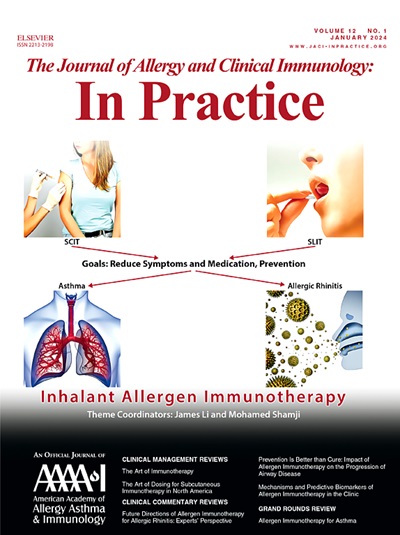对美泊利单抗的早期治疗反应可预测严重嗜酸性粒细胞性哮喘的临床缓解。
IF 8.2
1区 医学
Q1 ALLERGY
Journal of Allergy and Clinical Immunology-In Practice
Pub Date : 2025-02-01
DOI:10.1016/j.jaip.2024.10.041
引用次数: 0
摘要
背景:美博利珠单抗可诱导严重嗜酸性粒细胞性哮喘(SEA)患者出现早期反应和临床缓解:美泊利珠单抗可诱导严重嗜酸性粒细胞性哮喘(SEA)患者产生早期反应并获得临床缓解:我们质疑对美泊珠单抗的早期反应能否预测未来的哮喘缓解,并试图确定美泊珠单抗治疗反应的最佳预测指标,以实现缓解:方法:利用澳大利亚美泊利珠单抗登记处调查3个月和6个月时对美泊利珠单抗的早期反应,并将其与12个月时的临床缓解联系起来。治疗反应通过哮喘控制问卷(ACQ)-5、口服皮质类固醇(OCS)剂量、恶化频率和支气管扩张剂后 FEV1 进行评估。临床缓解在 12 个月时进行评估,其定义为 12 个月时 ACQ-5 ≤1.0、前 6 个月无加重、前 6 个月未因哮喘使用过 OCS。我们估算了用于内部验证的乐观校正曲线下面积(AUC):我们对 255 名 SEA 患者进行了分析。78名患者(30.6%)在12个月后获得了临床缓解。一个包括 ACQ-5 评分、加重频率、OCS 剂量和 6 个月时支气管扩张剂后 FEV1 的预测模型比 3 个月时的指标更能预测病情是否得到缓解。6 个月时的 ACQ-5 评分具有最高的乐观校正 AUC,为 0.778 [95% CI:0.719-0.833]。ACQ-5 评分 结论:6个月时的ACQ-5评分是预测使用美泊利珠单抗治疗的SEA患者在12个月时达到临床缓解的最佳指标。这些结果可用于设计哮喘的 "靶向治疗 "范例,即在6个月时评估治疗反应以预测临床缓解。本文章由计算机程序翻译,如有差异,请以英文原文为准。
Early Treatment Response to Mepolizumab Predicts Clinical Remission in Severe Eosinophilic Asthma
Background
Mepolizumab can induce an early response and clinical remission in people with severe eosinophilic asthma (SEA).
Objective
To find whether early response to mepolizumab (100 mg) could predict future asthma remission and to identify the best predictor of treatment response to mepolizumab for achieving remission.
Methods
The Australian Mepolizumab Registry was used to investigate the early response to mepolizumab at 3 and 6 months and relate this to clinical remission at 12 months. Treatment response was assessed using the 5-item Asthma Control Questionnaire (ACQ-5), oral corticosteroid (OCS) dose, exacerbation frequency, and postbronchodilator FEV1. Clinical remission, assessed at 12 months, was defined as an ACQ-5 score less than or equal to 1.0 at 12 months, no exacerbations in the previous 6 months, and no OCS use for asthma in the previous 6 months. We estimated the optimism-corrected area under the curve for internal validation.
Results
We analyzed 255 participants with SEA. Seventy-eight (30.6%) participants achieved clinical remission at 12 months. A prediction model including ACQ-5 score, exacerbation frequency, OCS dose, and postbronchodilator FEV1 at 6 months was more predictive of achieving remission than measures at 3 months. The ACQ-5 score at 6 months had the highest optimism-corrected area under the curve of 0.778 (95% CI, 0.719-0.833). An ACQ-5 score less than 1.5 at 6 months had a sensitivity of 85.9% for achieving clinical remission, whereas an ACQ-5 score less than 0.75 had a specificity of 84.7%.
Conclusions
The ACQ-5 score at 6 months was the best predictor of achieving clinical remission at 12 months in people with SEA treated with mepolizumab. These results can be used to design a treat-to-target paradigm for asthma, in which treatment response is assessed at 6 months to predict clinical remission.
求助全文
通过发布文献求助,成功后即可免费获取论文全文。
去求助
来源期刊

Journal of Allergy and Clinical Immunology-In Practice
ALLERGYIMMUNOLOGY-IMMUNOLOGY
CiteScore
11.10
自引率
9.60%
发文量
683
审稿时长
50 days
期刊介绍:
JACI: In Practice is an official publication of the American Academy of Allergy, Asthma & Immunology (AAAAI). It is a companion title to The Journal of Allergy and Clinical Immunology, and it aims to provide timely clinical papers, case reports, and management recommendations to clinical allergists and other physicians dealing with allergic and immunologic diseases in their practice. The mission of JACI: In Practice is to offer valid and impactful information that supports evidence-based clinical decisions in the diagnosis and management of asthma, allergies, immunologic conditions, and related diseases.
This journal publishes articles on various conditions treated by allergist-immunologists, including food allergy, respiratory disorders (such as asthma, rhinitis, nasal polyps, sinusitis, cough, ABPA, and hypersensitivity pneumonitis), drug allergy, insect sting allergy, anaphylaxis, dermatologic disorders (such as atopic dermatitis, contact dermatitis, urticaria, angioedema, and HAE), immunodeficiency, autoinflammatory syndromes, eosinophilic disorders, and mast cell disorders.
The focus of the journal is on providing cutting-edge clinical information that practitioners can use in their everyday practice or to acquire new knowledge and skills for the benefit of their patients. However, mechanistic or translational studies without immediate or near future clinical relevance, as well as animal studies, are not within the scope of the journal.
 求助内容:
求助内容: 应助结果提醒方式:
应助结果提醒方式:


